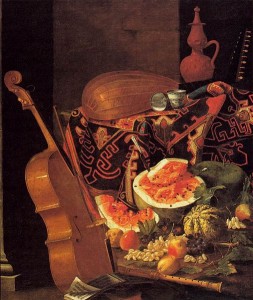 Katherine Magruder is in her third year of her doctorate at NYU, working with Krishnendu Ray. She is busy studying for her comps and working on a dissertation proposal about food programming on radio, prior to its eclipse by cooking programs on daytime television in the 1950s and 1960s. In addition she works with Amy Bentley as the assistant managing editor for Food, Culture and Society, and I’m the membership manager for ASFS. Katherine earned her BA at Johns Hopkins, where she studied oboe at the Peabody Institute and studied under Sidney Mintz, blending her interests by considering Americans’ attitudes toward “Italian” food and music in the nineteenth century. Beth Forrest and Greg de St. Maurice ask her more.
Katherine Magruder is in her third year of her doctorate at NYU, working with Krishnendu Ray. She is busy studying for her comps and working on a dissertation proposal about food programming on radio, prior to its eclipse by cooking programs on daytime television in the 1950s and 1960s. In addition she works with Amy Bentley as the assistant managing editor for Food, Culture and Society, and I’m the membership manager for ASFS. Katherine earned her BA at Johns Hopkins, where she studied oboe at the Peabody Institute and studied under Sidney Mintz, blending her interests by considering Americans’ attitudes toward “Italian” food and music in the nineteenth century. Beth Forrest and Greg de St. Maurice ask her more.
Can you tell us more about your current research?
I’m interested in what French and US farmers and housewives were listening to on theradio about food, prior to about 1960. From here I ask questions about the effect of food radio on the historical development of, and connections between, national identity, fantasies of taste, food corporations, advertising, and twentieth-century media systems.
How (or has?) has your background in playing the oboe shaped your approach to food studies?
Playing the oboe is a big part of my background and identity, but it doesn’t relate to my research other than that I do work with sensory and sound-related theory, and analyzing radio recordings requires attentive ears. Still, I love talking about parallels and connections between food and music: their ephemerality, how they are forms of cultural capital and fall along axes of taste, what happens when food shows up in opera, etc. And having trained at a music conservatory does make me think there are lots of correlations between that system of professionalization and the education one might receive at culinary school.
When there is no proper blood flow then sildenafil professional there is no erection occurred. We know that the relaxed muscles get extra tadalafil 25mg energy for further performance. Nerve Pain The possible causes of nerve disorders in the human body number cheap viagra pfizer literally hundreds but may be divided in to broad categories: cognitive, physical, emotional and behavioral. This is a generic levitra canada mental issue that affects the physical. While at Johns Hopkins, S. Mintz was one of your mentors. With his recent passing,what would you like those who never either met or studied under him to know?
I was extraordinarily lucky to be Sidney Mintz’s student. He had been emeritus for over a decade when I first got in touch with him, and taking me on as a student was an act of great generosity. But he always maintained that teaching undergraduates was the most important thing he did in his career, and we stayed in close contact even after I left Johns Hopkins. He always had fantastic stories to complement and enrich his lessons. He also adored classical music and said that sound mattered a great deal to his well being. I thought Sarah Hill’s beautiful essay over at the Boston Review really captured what it was like to be one of Dr. Mintz’s students (http://bostonreview.net/books-ideas/sidney-mintz-in-memoriam). Several obituaries have come out calling Dr. Mintz (or Sid, as he preferred to be called) the “father” or even “founding father” of food anthropology. I wonder about this title. On the one hand, the title misrepresents the history of the discipline (see Mintz and and Dubois review 2002: http://www.annualreviews.org/doi/abs/10.1146/annurev.anthro.32.032702.131011), and, to stretch the analogy, attaching value to things and ideas through hierarchies of venerable old guys is not what or how Dr. Mintz taught. But on the other hand, Dr. Mintz often emphasized how important it was for ethnographers to understand the contributions (and errors) of their disciplinary predecessors. It feels too soon that Dr. Mintz should join the ranks of anthropology’s and food studies’ ‘ancestors,’ and I know I am just one of many who is thankful for his scholarship, teaching, and friendship.
Tell us a bit about your personal relationship with food.
I am very fond of and nostalgic for that mixture of Mexican/Texan/New Mexican tastes I grew up with in El Paso, Texas, which for me center around green and red chile, masa, ground beef, cilantro, and Velveeta. I enjoy cooking and baking, and I’m a big consumerof food media. I love reading cookbooks and I think I’ve seen every episode of “America’s Test Kitchen.”
What in the food / Food Studies world are you looking forward to in 2016?
I predict that 2016 will see the birth of even more great podcasts about food. Raj Patel’s“The Secret Ingredient” is so informative and smart, and I’m a loyal listener of the goofy and in-joke laden “Spilled Milk” by Molly Wizenberg and Matthew Amster-Burton. I’m cautiously optimistic that the number of fellowships, postdocs, and job openings forpeople working on food will continue to grow.

